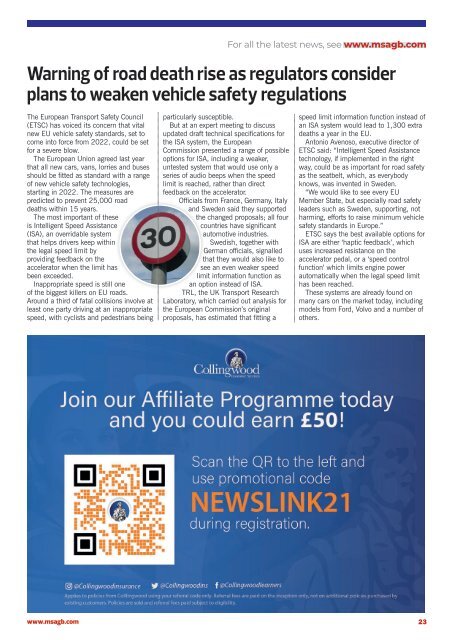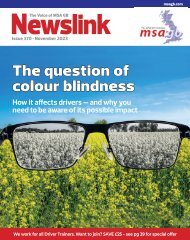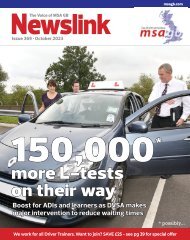You also want an ePaper? Increase the reach of your titles
YUMPU automatically turns print PDFs into web optimized ePapers that Google loves.
For all the latest news, see www.msagb.com<br />
Warning of road death rise as regulators consider<br />
plans to weaken vehicle safety regulations<br />
The European Transport Safety Council<br />
(ETSC) has voiced its concern that vital<br />
new EU vehicle safety standards, set to<br />
come into force from 2022, could be set<br />
for a severe blow.<br />
The European Union agreed last year<br />
that all new cars, vans, lorries and buses<br />
should be fitted as standard with a range<br />
of new vehicle safety technologies,<br />
starting in 2022. The measures are<br />
predicted to prevent 25,000 road<br />
deaths within 15 years.<br />
The most important of these<br />
is Intelligent Speed Assistance<br />
(ISA), an overridable system<br />
that helps drivers keep within<br />
the legal speed limit by<br />
providing feedback on the<br />
accelerator when the limit has<br />
been exceeded.<br />
Inappropriate speed is still one<br />
of the biggest killers on EU roads.<br />
Around a third of fatal collisions involve at<br />
least one party driving at an inappropriate<br />
speed, with cyclists and pedestrians being<br />
particularly susceptible.<br />
But at an expert meeting to discuss<br />
updated draft technical specifications for<br />
the ISA system, the European<br />
Commission presented a range of possible<br />
options for ISA, including a weaker,<br />
untested system that would use only a<br />
series of audio beeps when the speed<br />
limit is reached, rather than direct<br />
feedback on the accelerator.<br />
Officials from France, Germany, Italy<br />
and Sweden said they supported<br />
the changed proposals; all four<br />
countries have significant<br />
automotive industries.<br />
Swedish, together with<br />
German officials, signalled<br />
that they would also like to<br />
see an even weaker speed<br />
limit information function as<br />
an option instead of ISA.<br />
TRL, the UK Transport Research<br />
Laboratory, which carried out analysis for<br />
the European Commission’s original<br />
proposals, has estimated that fitting a<br />
speed limit information function instead of<br />
an ISA system would lead to 1,300 extra<br />
deaths a year in the EU.<br />
Antonio Avenoso, executive director of<br />
ETSC said: “Intelligent Speed Assistance<br />
technology, if implemented in the right<br />
way, could be as important for road safety<br />
as the seatbelt, which, as everybody<br />
knows, was invented in Sweden.<br />
“We would like to see every EU<br />
Member State, but especially road safety<br />
leaders such as Sweden, supporting, not<br />
harming, efforts to raise minimum vehicle<br />
safety standards in Europe.”<br />
ETSC says the best available options for<br />
ISA are either ‘haptic feedback’, which<br />
uses increased resistance on the<br />
accelerator pedal, or a ‘speed control<br />
function’ which limits engine power<br />
automatically when the legal speed limit<br />
has been reached.<br />
These systems are already found on<br />
many cars on the market today, including<br />
models from Ford, Volvo and a number of<br />
others.<br />
www.msagb.com<br />
23

















